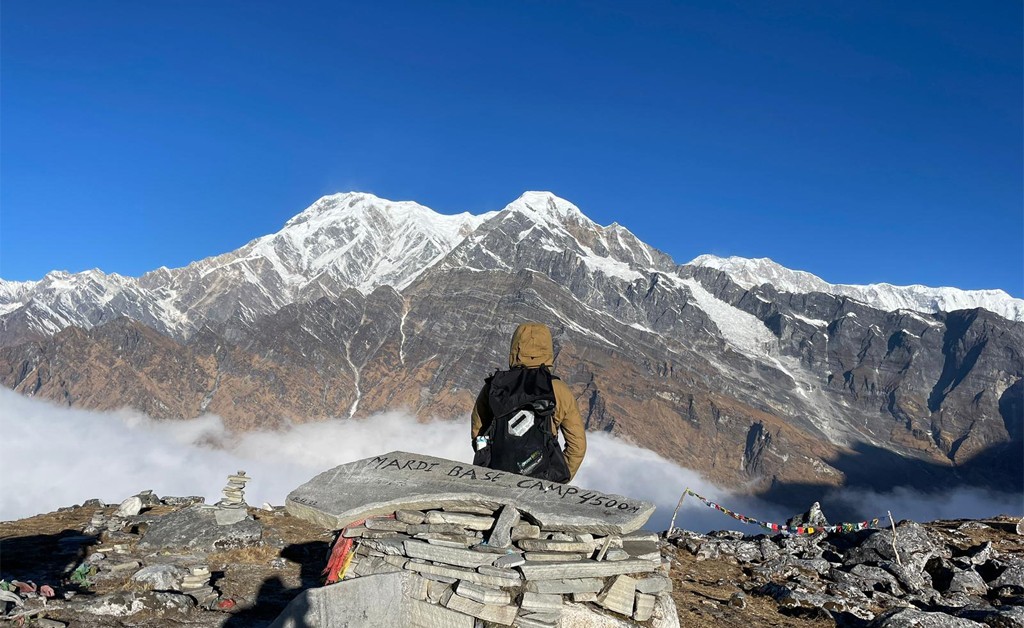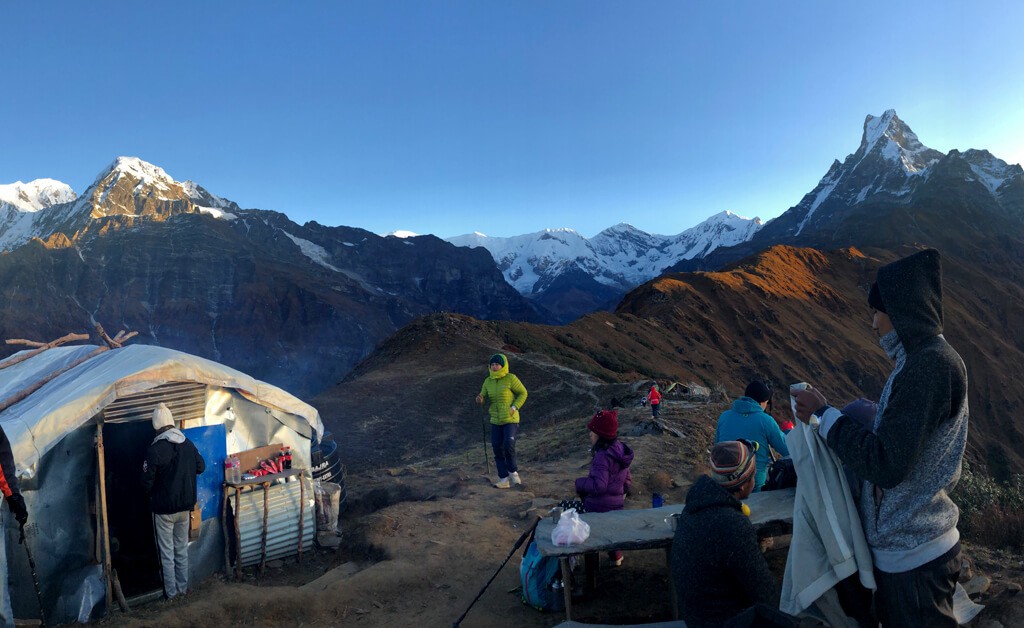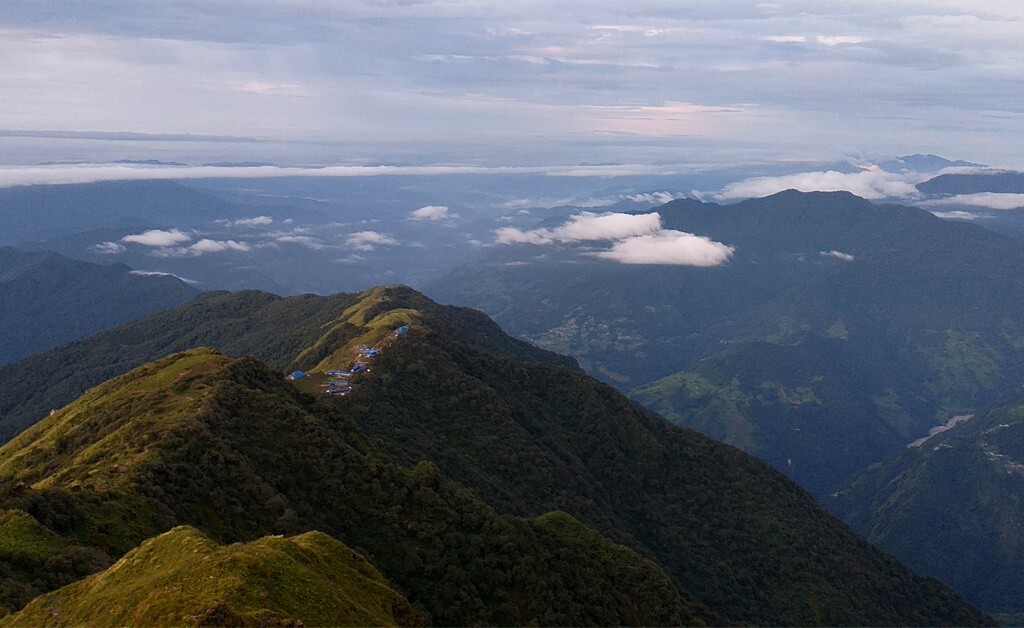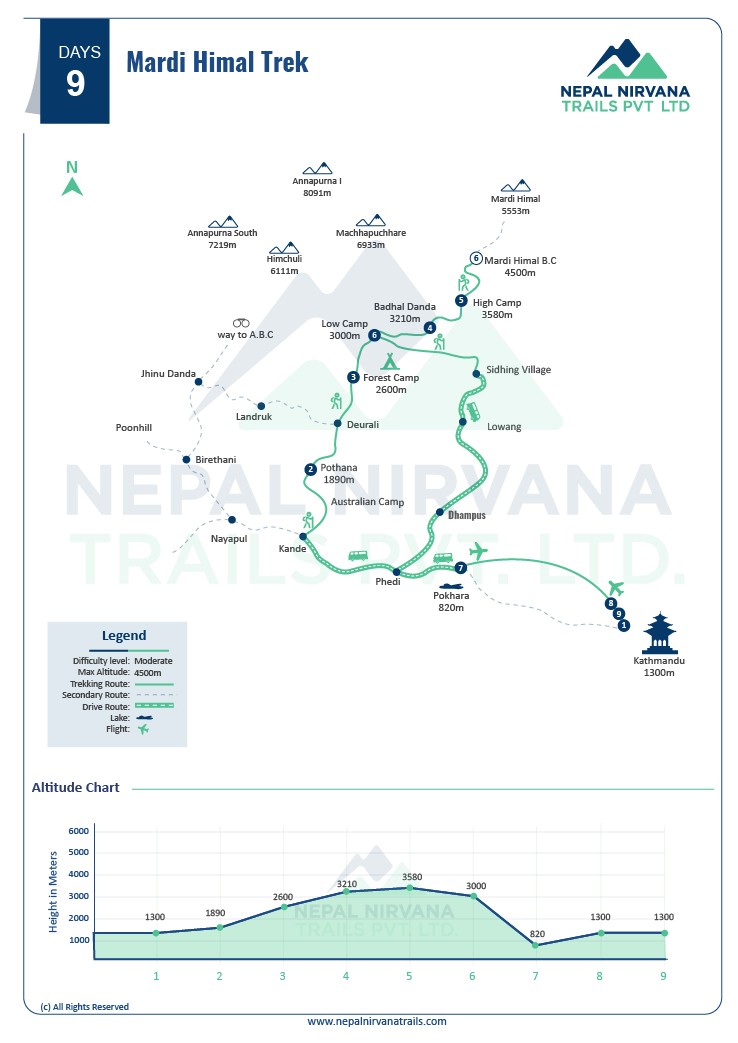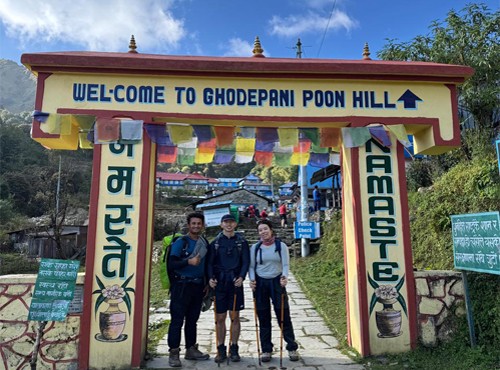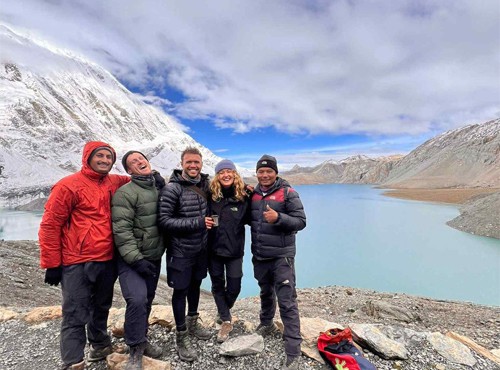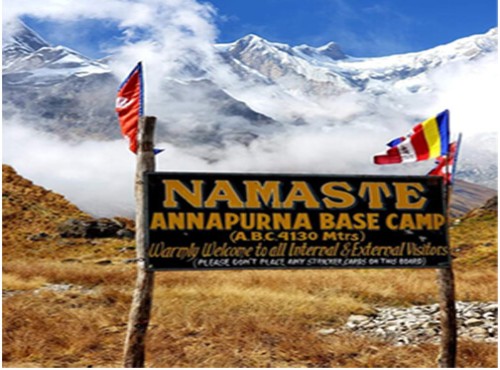Mardi Himal Trek difficulty
Mardi Himal Trek is not a difficult trek but does involve a few off-the-beaten sections along the trekking route. Overall, the Mardi Himal Base Camp trek is moderate. The trail explores the hidden corner of Annapurna massif.
Trek to Mardi Himal Base Camp is all about continuous ascents and descents through forested and rugged paths. Therefore, the trekkers have to be physically fit to walk long hours, carrying their day pack. Previous trekking experience is not needed for Mardi Himal Trek 9 Days, however strong determination and will to complete the journey is crucial.
Altitude Sickness
You will hike up to 4,500 meters/14,760 ft during the Mardi Himal Trekking. As it is a pretty high elevation, there is a chance of altitude sickness if your body does not acclimate properly during the trek.
Our Mardi Himal Trek itinerary is composed, maintaining the rise in elevation that allows the trekkers to adapt to the altitude as they move further towards the final destination.
You can do the following things to stay away from altitude sickness:
- Never consume alcoholic drinks or anything that may dehydrate your body on the way. Dehydrated bodies are prone to altitude sickness. With that being said, keep yourself hydrated, drink plenty of water and other fluids like soup.
- Meet your doctor and get prescribed medicine for altitude sickness, food poisoning, headache, cold, etc to carry while trekking.
- Do not ascend more than 500 meters in a day.
- Difficulty in breathing, headache, insomnia, dizziness, etc, are a few early symptoms of altitude sickness.
Mardi Himal Trek distance
Mardi Himal Base Camp Trek covers a total distance of 41 km (25 miles). Kande, the starting point of the trek, is situated 27 km (16.7 miles) north of Pokhara.
Mardi Himal Trek route
The Mardi Himal Trek route starts at Kande. From here, the trail winds through dense forests to Pothana. This place is also known as Australian Camp. Continue ascending towards Pritam Deurali and join the Annapurna Sanctuary. You will go through lush forests of oak, rhododendron, maple, etc to Forest Camp, also known as Kokar, by the locals.
The next destination from here is Badal Danda at 3,210 m/11,528 ft that offers stunning mountain views. Further, you will climb along the grassy slopes to High Camp.
The last stop from High Camp is the Mardi Himal Base Camp. You will cross two steep sections before reaching the base camp. On the way back, follow a different route to Sidhing village, from where you will drive back to Pokhara.
Training for the Mardi Himal Base Camp Trek
Mardi Himal Trek is a moderate trek. Trekkers do not need to follow any strenuous training for the venture. The Mardi Himal Trek route is little on the rough side than any other moderate treks in the Himalayas, therefore the trekkers have to be fit.
To prepare for Mardi Himal Base Camp Trekking, you can go on hikes that include 5 to 6 hours of walking minimum. The main focus point while preparing for Mardi Trek should be increasing your walking hours and core body strength. You can also do other activities like swimming, cycling, or make a routine in the gym to get you ready for the trek.
Mardi Himal Trek Solo/Private/Group
For trekkers who are looking to do Mardi Himal Trek solo can opt for our private trek option. We will help you create the perfect Mardi Himal Trek itinerary.
Likewise, you can join our existing group and trek with like-minded people. Or, if you have your own group, then let us organize the Mardi Himal Trek and enjoy the perks of trekking with a company that has over two decades of running treks in the Himalayas.
Last Minute Booking for Mardi Himal Trek
Last-minute booking for Mardi Himal Trek can get sloppy, especially in the peak season. Thankfully not many trekkers choose Mardi Himal, therefore arranging accommodation and other essentials at the last minute is relatively easy.
To book the Mardi Himal Trek package with us at the last minute, you have to pay the 100% of the Mardi Himal Trek cost. After the confirmation from our side, one of the team representatives of Nepal Nirvana Trails will assist you with the preparation.
Mardi Himal Trek Permits
The permits for Mardi Himal Base Camp Trek are the same as Annapurna Base Camp Trek. You have to obtain Annapurna Conservation Area Project (ACAP) permit and TIMS card to trek.
ACAP costs NPR 1000 to SAARC nationals and NPR 3000 to all other nationals.
TIMS costs NPR 2000 to all foreign nationals.
*Note: Your Mardi Himal Trek permits are covered in our Mardi Himal Trek package cost. Moreover, our team will obtain all the permits on our behalf in advance and save you the hassle of dealing with the specifications of the permit offices.
Mardi Himal Trek time
The perfect time of the year to do Mardi Himal Trekking is from March to April in spring and October to November in the autumn when the weather is mostly stable. In these two seasons, you will get to enjoy the best views of the mountains, and the mild temperature makes the walking fantastic.
The temperature varies from 18°C at the lower elevation to 5°C or below at the higher elevation (especially in the mornings & nights). The daytime is generally warmer than dusk.
Accommodation
On our Mardi Himal Trek 9 days, you will be spending nights in the tea house during the trek. In Kathmandu and Pokhara, we will book you a nice tourist standard hotel. The tea houses along the Mardi Himal Trek route are very basic. You cannot expect anything fancy or modern amenities.
Twin sharing rooms are booked unless you ask for a single room. The washroom can be private or common, depending upon the tea house. Usually, rooms in the tea houses are small with a couple of beds, blankets, pillows, and a few other types of furniture.
Food
While trekking, you will mostly get dishes like dal bhat (a staple meal for Nepalese), curries (veg/non-veg), chapati, momo, noodles, thukpa, sandwich, porridge, curry, mashed potatoes, etc have as a meal. Similarly, for breakfast, you can expect muesli, oatmeals, toast, egg, corn, tea, coffee, etc. Our Mardi Himal Trek package offers three meals during the trek.
We recommend you to choose dal bhat and veggies in at least one meal a day because it is the most healthy and fresh food option you will get during the trek. In Kathmandu and Pokhara, you will get breakfast and a welcome & farewell dinner. For other meals, you are free to choose and dine in whatever place you want.
Trek Responsibly
To trek responsibly, the first thing you can do is to travel with a local trekking agency and buy as much trekking clothing/gear from Nepali brands as possible. By doing so, you will be promoting Nepali=’s businesses and contributing to the economy of the country.
Likewise, make sure to check how the trekking agency organizes their trips in the Himalayas and what sorts of measures they take for sustainable travel. Other than this, you can carry reusable water bottles instead of buying plastic water bottles on the way and do not throw trash on the trail.
Travel Insurance
Because Mardi Himal Base Camp Trekking is a high-altitude journey in a remote area, we recommend getting travel insurance to our guests. If an emergency occurs while trekking (rare scenario), then the travel insurance gives us the power to provide immediate medical assistance to our guests. Your travel insurance should cover air evacuation up to 6000 meters and medical expenses.
Travel Tips (electricity, internet, ATM, luggage, tipping, personal expenses)
- You may need little spare cash to buy extra drinks, snacks, or services like a charging booth, hot shower, etc during the trek. There is no ATM on the way to Mardi Himal Base Camp, so withdraw enough in Pokhara or Kathmandu.
- To charge your electronic devices, you can use the charging areas in the teahouses or carry spare batteries.
- Internet service is not great while trekking. You can get a Nepali sim and use cellular data where the network seems stable. It's better to keep your expectations low for a good internet connection during Mardi Himal Trek.
- During the trek, our porters will carry the main luggage. Every member of the group is allowed to pack up to 10 kgs as main luggage. The trekkers can carry a day pack with other essentials.
- Tipping is a custom in Nepal after the completion of the journey. As per your satisfaction level, you are free to tip whatever amount you like. It is mandatory.
- Personal expenses like travel insurance, tips, shopping, international flight fare, etc, are not included in the package cost.
